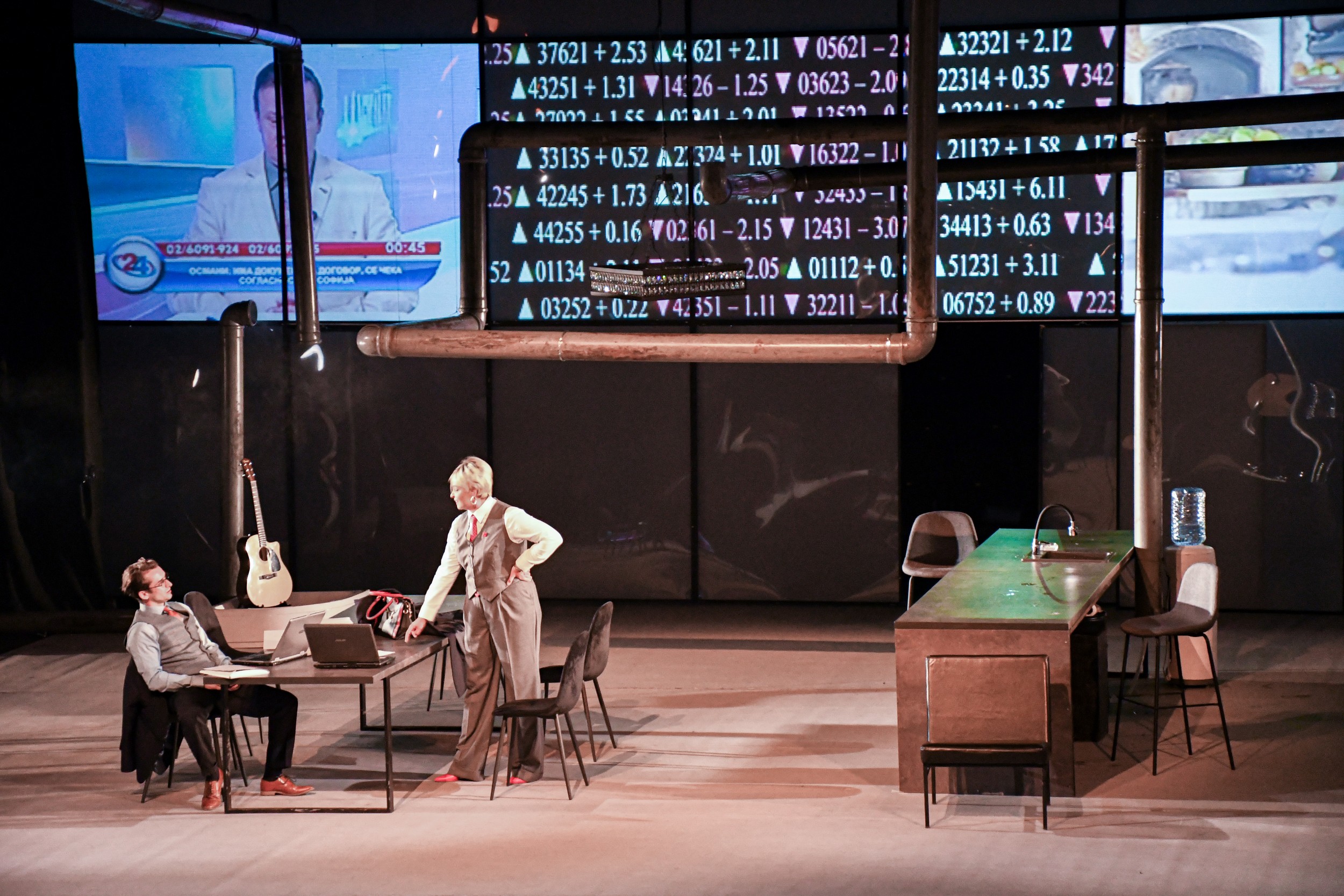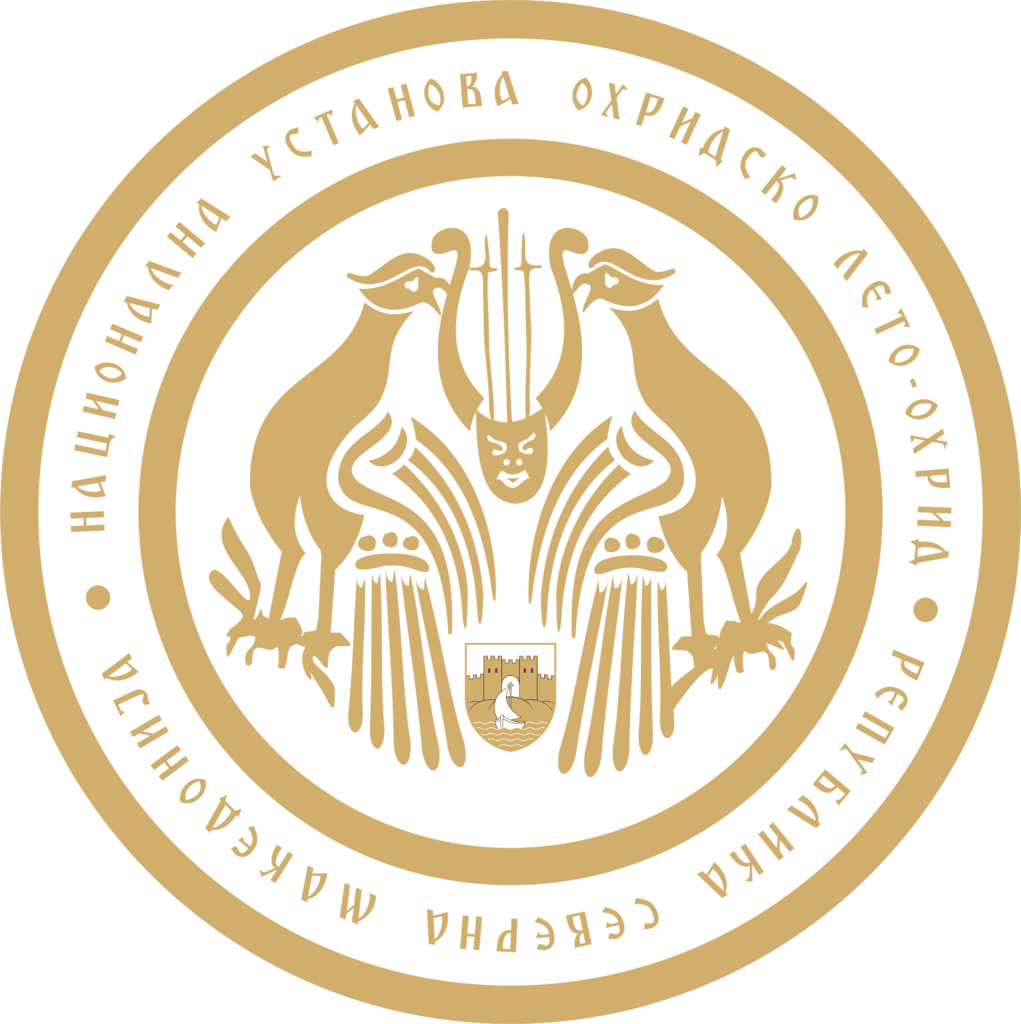
The theatre play “Enemy of the people” by Henrik Ibsen, directed by Nina Nikolic, performed by NI Macedonian National Theatre from Skopje at the Ohrid Summer Festival this year, is one of the rare occasions which shows you the diagram of society in the actual moment. What the Norwegian playwright and writer Henrik Ibsen (Henrik Johan Ibsen, 1828 – 1906) wrote the drama text in 1882, 140 years ago, does not deprive it from its actuality. On the contrary: the truth-loving vs the power-loving, the self-conscious individual vs the political pack, the moral integrity vs the existential problems, the social engagement vs the damages suffered by families, the self-sacrifice vs pcnsormism… That’s why, not accidentally, “Enemy of the people” is one of the most performed plays by Ibsen, considered the creator of the modern drama, with more that 1880 premieres on theatre stages in all continents: Europe, Asia, Africa, Australia, North and South America –who, due to the criticism of the Norwegian society, was stateless and created in Italy and Germany for about ten years.
The play “Enemy of the people” by Ibsen, also known as “Nora”, “Per Gant”, “Dollhouse” – maybe best depicts the controversial image valid for him as a writer, both during his lifetime and after his death. Labelled a socialist, an anarchist from one side, but also an absolute moralist from another, Ibzen is also treated as a playwright of the Niche’s philosophy of nihilism (Friedrich Wilhelm Nietzsche; 1844 – 1900). For the sake of truth, there is more than just a grain of nihilism in “Enemy of the people”. Let’s go one by one.
The drama follows the fate of d-r Thomas Stockman (played by Nikola Ristanovski), doctor in a local spa healing place, after he finds out that the water used by the tourists-patients is not only polluted, but is the source of various dangerous diseases. His report, at first glance, will meet delight in Hovstad, editor of the newspaper “People’s Messenger” (Sashka Dimitrovska) and Billing (Aleksandar Mihajlovski), collaborator in the paper, who considered dr Stockman could make a revolution in society with his revelation.But, only at first glance…
From the other side, Dr Stockman’s brother, Peter Stockman (Blagoj Veselinov), Mayor and President of the Spa Board, is more than consternated from the report for the water pollution. He thinks that the city has lived up economically and politically from the visitation of the spa healing space, and that his brother’s report – which proposes closing of the spa for two years and replacing of the plumbing system – is a real financial disaster for the municipality, which cannot sustain that.
His opinion shares Mortene Kiil (Petre Arsovski), Katarina’s step-father, wife of Thomas Stockman: he is an industrialist with leather and his tanners are the main pollutants of the city waters.
Opposite to this “outside” ring, the confrontation of d-r Stockman with the metastasized civil society, represented by the spa healing, draws one “inner” ring, within his family. His wife Katarina (Zvezdana Angelovska) is the pillar of the family, and tries to balance between the rightfulness of her husband and the existential needs of the family. The oldest daughter Petra (Darja Rizova) is a teacher, and she absolutely shares her father’s convictions and the struggle against the conformism and profit of the ruling society layer, so she will also be put under the hit of the political “hammers”.
Just like every revolution, this one by Dr Stockman starts with a great dose of romantic conviction that the society can – and should! – change: it should reveal the truth in the media, no matter if the economy is damaged, so everyone can have a healthy and safe environment. But, just like every revolution, the changes in society initially start with the ones who rule it – they are the ones to be “eaten”. In the interpretation of the Ibsen’s nihilism by Nina Nikolic, born in 1987 in Skopje, one pf the most prominent director’s names on the Macedonian theatre scene, but also in the region, equally focused on the theoretical researches and practice – one can notice retrospective points of more or less all revolutions, where there is confrontation between two brothers, son-in-law and father-in-law, husband and wife, two friends, ratio and ideal, vision and bluntness, freedom paper with printing expenses, professionalism and manipulation…through the subtle weaving of the drama confrontation, up until its climax.
That climax, just as the whole play, confirms the fears of the viewer who (will) win in the battle of the individual vs the system. Such an individual should be the “raw” material in the political machine for mincing meat, and the fate of Dr Stockman cannot be different. However, the choice of all Dr Stockmans in this world is whether they will give up without a fight, fearing the sound of empty stomach in themselves and their family members, or, there are certain ideals which are more valuable than a full stomach topped with a cup of punch.
Just as the director setting of Nikolic in “Enemy of the people” excellently graduates the play and its rhythm, we get the impression that the viewers (again and again) witnessed a full-blood creation by Nikola Ristanovski, with his well-known spectrum of expressive manners to the fullest and impeccable condition. The strongest impression was given by his longer monologue which synthesizes almost all modern political concepts through the simple setting of the dilemma – bread or poison, and its answers.
Veselinov as Petar Stockman, Angelovska as Katarina, Rizova as Petra, Dimitrovska as Hovstad and Arsovski as Mortene, on the frontline, are virtuous enough to accept the “sparring-partner” roles which additionally define Stockman of Ristanovski as an outstanding role. Nevertheless, “Enemy of the people” was announced the best play at the 56th Macedonian Theatre Festival “Vojdan Chernodrinski” this year, held in Prilep this May, and the play was awarded the Best Actor – Nikola Ristanovski, scenography – Vishnja Vujovic and marketing material – Dimitar Dimitrov.
The Ibsen’s drama world in the director’s setting by Nikolic “breathes” through the minimalistically transparent scenography (Vishnja Vujovic), through which occasionally leak theatrical fog as association to the spa atmosphere, whereas the costumes (Ivana Karanfilovska – Ugurovska) (re)present the decency of the middle class. In the range of the good acting vibrations are also Mihajlovski, as Billing, Nino Levi as Aslaksen, owner of a printhouse, Martin Gjorgoski as captain Horstar, Jana Veljanovska as Ejlif and Ana Arsovska as Mortine, the younger daughters of dr Stockman, who complete the image of a complete – or rather, complementary, completing – theatrical experience.Stojan Sinadinov

